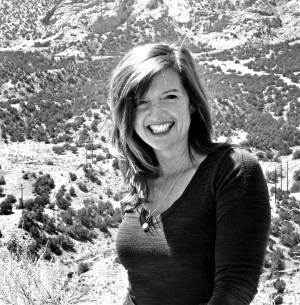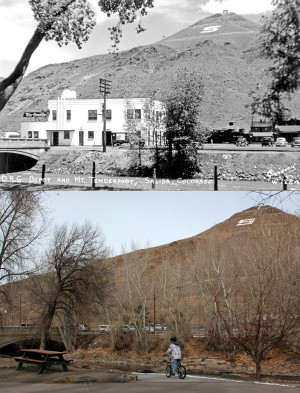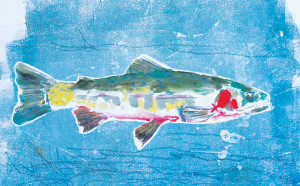By Kevin Patrick
“I’m callin’ about the stay away.”
“The stay away?”
“Yeah. The stay away.”
… “The STAY away?”
We began again. The serves and whiffs went on for a ridiculous minute before I realized a transplanted New Englander was responding to an ad I’d run to get help rebuilding a stairway (“stay away”). What you say hinges delicately on how you say it.
Place names tend to be less confusing, as they’re generally embedded in a rich contextual stew of language, geography and history. But even if the meaning is clear, many within earshot generally stand ready and willing to be offended by your pronunciation.
Some dabblers subscribe to the idea that only locals know how to properly articulate their environs, and many articles purport to straighten us all out in this regard. But I’m skeptical. For one thing, these things evolve. My father spent much of his childhood in Ouray, and he carefully taught me to say “OOray.” When my wife and I lived there, we adopted “yeRAY,” as that’s what everyone else said. Now, many say it’s a flat “You-Ray.”
[InContentAdTwo]
Years ago, I met a kindly landscape artist in Taos by the name of Ouray Meyers. He used my father’s pronunciation in referring to both himself and the mountain village – where, incidentally, he was born. Several good histories agree that the famous peacemaker was “OOray,” or “OOlay,” the latter reportedly because Utes had difficulty pronouncing “r.” Early documents, including those written by the chief, show a variety of spellings, often “Uray,” or “Ure,” so it seems “You-Ray” can’t be far wrong.
Many have repeated the speculation that the name comes from the Ute word, uri, meaning “tipi pole,” or uur, meaning “arrow.” But the chief himself said more than once that the word had no meaning. It was simply the first word he’d uttered as a child.
Recently, I’ve preferred “OOray” for a couple of reasons. First, though they probably never met, my father and Ouray Meyers agree on this pronunciation. Both logged early childhoods in Ouray, so “OO” must’ve reflected the prevailing wisdom in town back in the ‘20s and ‘30s. Since the great man’s wife Chipeta lived in the area until her death in 1924, there’s a good chance the townsfolk had it right. Second, Ouray himself apparently revised the spelling from “U” to “OU.” Why would he do that, except to hint at pronunciation? Now the Southern Utes tell me most of their elders say it’s “OHray.” That also explains the “o.”
Another reason to take local pronunciations with a grain of salt is that the locals often disagree. Some of these donnybrooks call to mind the train station scene in The Quiet Man (1953), in which the villagers nearly come to blows over the best route to Innisfree. And, as also in the movie, locals sometimes cling charmingly to specious logic. When I first ran the Imogene Pass Run, I asked an old-timer how to pronounce it. “EYEmogene,” he said, because “it does have an ‘I’ in it.”
So how does one navigate Colorado’s challenging typonomy? What is “correct”? Well, personally, I’d avoid intimations of absoluteness. After all, in geologic terms, most landmarks will outlast our tongues and possibly even our species. We might feel their deeper names, but we can’t articulate them. There are often many roads to – and names for – Innisfree. The best approach is to use the poet Kathleen Cain’s advice for navigating the wilds of Ireland: get close and ask three people. And be sure to take everything with good humor – especially whatever you manage to come up with on your own.
It’s a good idea to start with a pronunciation in mind, if only to hold up your end of some interesting conversations. You might want to incorporate my rough guidelines, listed below, into your research. I expect they’ll either be useful to grateful thousands, or so controversial that I’ll have plenty to write about for years to come. Just remember these are simply one native’s ideas about making verbal sense in our region. For what it’s worth, I’m an auditory learner, inclined to favor pleasing or musical sounds.
LISTEN FOR THE ECHO – “Colorado” is, of course, the Perfect Noun, not only because it connotes spectacular and historic territory – upon which crawl, by and large, a vigorous and contented people – but because it rolls off the tongue and bears repeating. Stick an “m” on the end, recite it at our famous blue views, and it’s a sublime meditation: what Jung called “the sound nature makes when it’s pleased with itself.”
Humans clearly enjoy the repetition of round tones. Consider the gentle Hawaiians, for example, who can’t resist vowels whether or not a consonant is handy. I’d argue that this idea should apply to the Perfect Noun. I grew up pronouncing it with a short “a” – as in “add.” Many natives still prefer this way of saying it. But when I went off to college, I switched irrevocably to “ColoRAHdo.” It just sounds better to me, probably because the “a” echoes the first “o.” And it just makes sense to have “ah!” in “Colorado.”
For years, you could pick out natives by how we referred to ourselves. We were “ColoraDOANs,” eager to skirmish with “ColoraDANs” over our identity. I remember thinking I would start using the latter word if and when the Fort Collins Coloradoan changed its name. But sound and simplicity won me over. Two vowels together interrupt the rhythm and echo for which my ear yearns. Also, shorter words are nearly always preferable, as nicknames illustrate. In any case, demography now favors the “dans” over the “doans.” As State Historian William Convery says, we’re all Coloradans, except in Fort Collins.
DON’T MOVE YOUR FACE – We’re fortunate in this corner of the world to be completely unencumbered by any accent. Our verbal communication is pure, so we might converse with angels. Visitors often seem unwilling to appreciate this, however. They contend we say things slowly, and pepper our speech with quaint expressions like “howdy” or “that’ll do.” They even accuse us of drawling. Be patient with these people. They simply fail to understand that our way of talking is perfect largely because it limits facial movement. This conserves energy.
The limited-face-movement axiom is congruent with the “ah” form of “Colorado,” but it also sort of works with “Coloradda,” which pops up in old Westerns. Mostly this variant makes the short “a” form more appealing by adding a new echo. But it also saves BTUs by getting two syllables out of one tweak of the cheeks. It’s not exactly my style, but it does trip nicely off the laconic tongue of John Wayne in Rio Bravo (1959).
HONOR THE CULTURE – When my wife and I lived in Houston years ago, some Texans (the ones inclined to say “rat cheer” for “right here”) referred to San Felipe Street as “San Flippy.” Their take on the word might have been perfectly innocent, but it always struck me as a subconscious slap at Latinos. Since then, I’ve tried to be more careful with place names that reflect on a culture.
But some choices are hardly clear-cut. The cultural mash-ups that defined Colorado over the last couple hundred years left some strange artifacts – Buena Vista (BV) being Exhibit A. Most visitors naturally assume that Spanish words should be pronounced in the Spanish way: “Bwayna Veesta.” But it so happens one Alsina Dearheimer, an influential member of the 1879 naming committee, insisted on an “American” pronunciation: “Byoona Vista.”
Someone should write a beefy text on the pioneer propensity for tweaking perfectly melodious non-English words. It seems we often believed we were building a new language along with a new country. This is understandable, in context. In the case of BV, local historian Suzy Kelly speculates that Ms. Dearheimer wanted the Spanish word to sound similar to “beautiful.” Pride of place would of course govern the white woman’s thinking, as the Collegiate Peaks Valley has, indeed, dropped many a jaw – and continues frivolously to do so. For decades, the long-timers were adamant about their way of saying it, but I sense a softening on the issue. Local historians say some residents do prefer the Spanish pronunciation. Folks travel more now, and want to obey the rules of language they’ve encountered in the wide world. These things being fluid, I wouldn’t be surprised if “Bwayna” eventually prevails.
Proselytizing is a bad idea, however. Visitors and residents can simply choose to honor white pioneer culture or Spanish-Native American culture. Interestingly, there were almost no Spanish-speaking residents of BV at its christening, and there have been few since. This has probably done much to preserve the quirk. Historian Wendy Oliver says Latinos passing though just roll their eyes. It’s their language, after all, and New Spain was just a stone’s throw to the south.
Why not go all the way and say “VEEsta” instead of “Vista?” I guess for the same reason we don’t roll our “r”s when ordering burritos. Minor Americanizations seem okay, especially for words that have been absorbed into common English. In any case, my lazy Western face shies away from long “e”s.
To be fair to beautiful BV, it’s important to note that Coloradans also say “SalEYEda” for Salida and “Del NORT” for Del Norte. The latter may well be replaced by the more formal “Del NorTAY,” but I’d be surprised if “SalEEda” catches on. The word was always too obscure for the pronunciation to seem obvious, and “EE” would sound dissonant now. I haven’t unearthed good excuses for the persistence of stranger twists, however. In Denver, for example, Zuni Street is pronounced “ZunEYE.” And many white natives still pronounce Pueblo, “PYEBlo.” I can’t make my mouth do those things.
Colorado is full of aboriginal monikers – primarily Ute and Arapaho. Many are relatively easy to sound out. But it’s important to bear in mind that these languages have little in common with European tongues. They seem halting and sing-song to Anglos. In general, slowing down to articulate each syllable helps. The linguists at CU tell me that the Arapaho Chief Hosa should technically be “Ho’sa,” as it has a glottal stop, which is common. Utes often accent the first or second syllable, but sometimes the second-to-last syllable gets the emphasis – “UncomPAHgre,” for example, or “SapiNERo.” This makes sense, as most Utes in the 19th century were more fluent in Spanish than English.
GET SHORT – The more we use words, the more we want to whittle them down. For years I felt guilty about shortening the Ute “Weminuche” (“WEEaminoochuh” or “WEEaminoochoo”) to the lazy-faced “WEMinooch.” But when I checked in with the tribe, I found that many of them say it similarly. I think this is just a natural process of simplifying well-worn expressions. By the time you’re halfway though a word like that, everyone knows where you’re going anyway. This shortening guideline is actually a corollary to the stoneface idea. Out here where the sun bakes and the wind blows bitter, it’s all about energy conservation.
So there you have it: Listen for the echo, don’t move your face, honor the culture, and get short. It works for me. Regardless of your approach to speaking Coloradan, it helps to remember we’re all just drifting along in a huge, relentless river of dialogue. This column begins a new current. Please send me your stories and ideas about this or any other topic relating to the Perfect Noun. I look forward. Email: kpmc@locuto.com
Kevin Patrick works hard, against impossible odds, to keep the word “hapless” out of his obituary. He is Chief Peregrinator at Upshot Travel (locuto.com/upshot.html).


